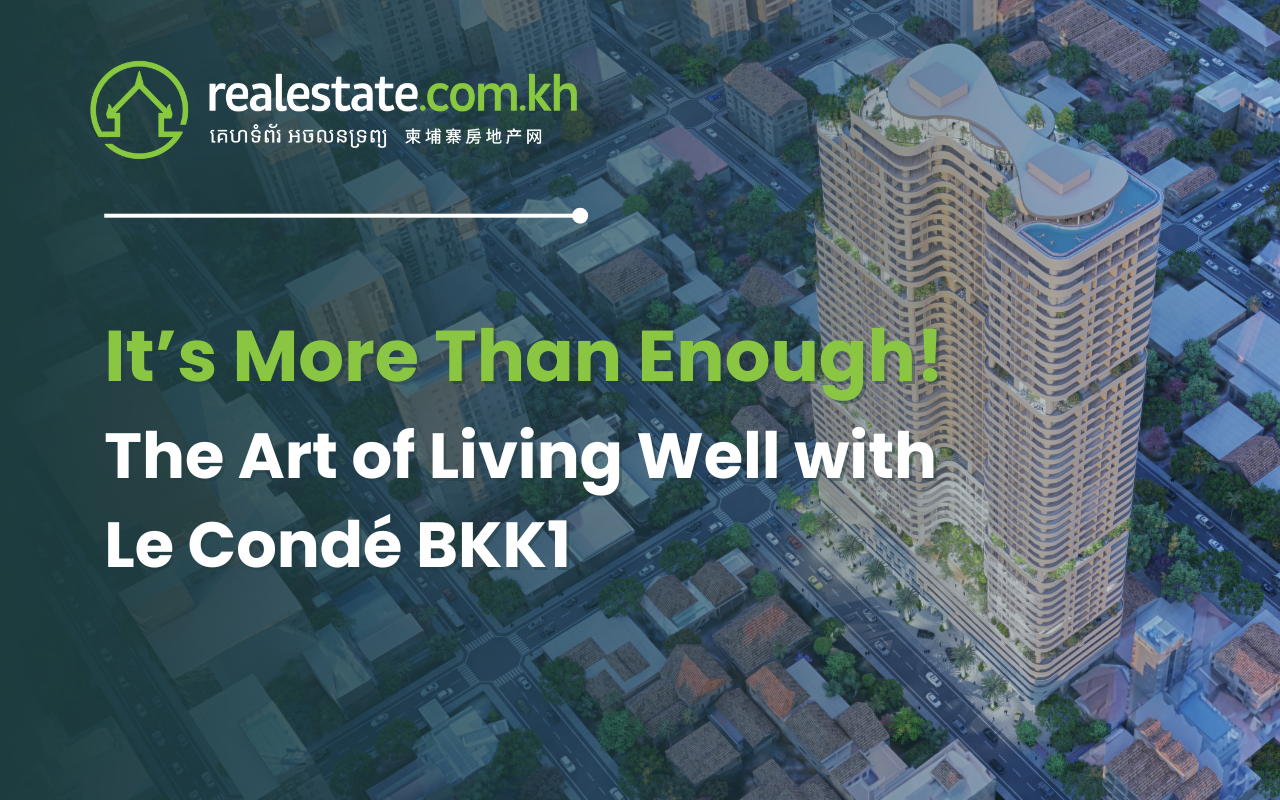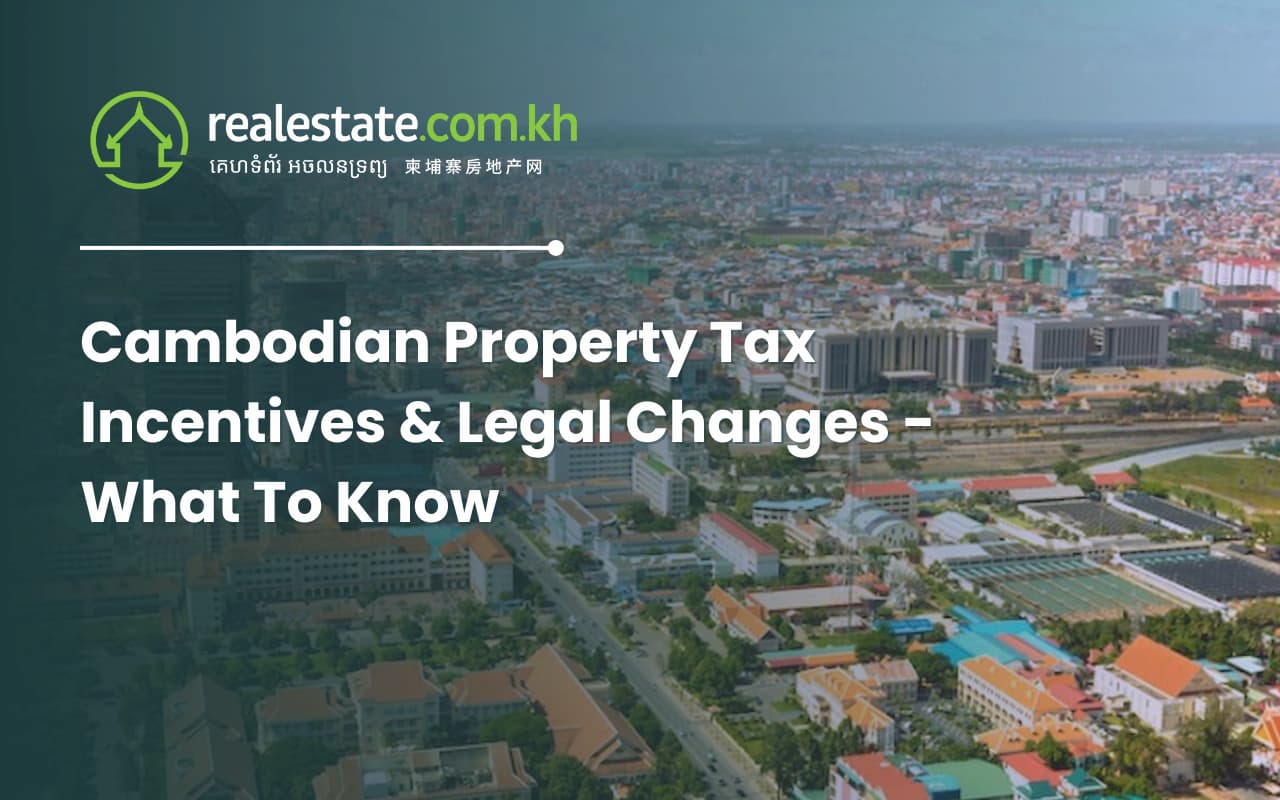Since the government’s commitment from the past decade to improve transparency and economic growth through Cambodian real estate law, the Kingdom has been one of the front-runners - and, in fact, one of the fastest growing economies in Asia.
This is due largely to the numerous Cambodian real estate law and policies that have been passed and put into effect during this time. A few of these was discussed by Allen Pheap Prak, Legal advisor of P&A Asia, during his presentation at the inaugural Cambodia Property Show organized by Realestate.com.kh and Property Guru.
Buying Condominium Units in Cambodia (Legal Qualifications):
Pheap Prak mentioned that before the law on foreign ownership for co-owned buildings was implemented, sales of condominium units were really low and needed a quick boost. This is why Cambodia began accepting investments from foreign investors – through strata titles – to increase sales.
Title deeds that are in the form of freehold strata titles could originally be held for 50 years and can also be mortgaged and put in a hypothec as collateral. But according to Pheap Prak, this policy didn’t initially have a provision to protect the locals.
So, after a year, the Ministry of Economy and Finance decided that foreigners should only be allowed to purchase units above the ground floor and should only be allowed to own up to 70 percent of the property. This way, the occupancy rate goes up without giving any unfair advantages.
He also states that a lot of developers have worked around the issue by either placing the parking area at the first few levels or turning the ground floor into a leasable commercial space.
Although, if you look at the condominium market today, Pheap Prak mentions that locals are currently buying 40 percent to 50 percent of these condominiums for rental income. So, it’s not much of an issue these anymore. According to Cambodian real estate law, the typical transaction for purchasing a co-owned building in Cambodia requires a sales and purchase agreement. All sales and purchase of real property in Cambodia should have certification or notary by a Cambodian lawyer.But Pheap Prak mentions that if you were to sign a sales and purchase agreement outside of Cambodia, it’s important that you get a notary to witness on your agreements.
He adds that if you want to rent a unit or retail space to operate food and beverage ventures, you do not need to get the tenancy agreement stamped by the local state council. However, if you were to rent a unit for office or residence, as a foreigner, that lease should be registered with a notary public so you can get a residence certificate to show that you can be in Cambodia and that you’re doing business here.
For a company though, if you’re using it as an office address, you also want to register it because you would have to withhold 10 percent to pay to the government as tax.
But it’s also important to note that for leases, it does not make a lease invalid if you’re not registered. Registering just means you’re compliant. Leases with 15 or more years, however, should be registered with the Ministry of Land. They give you a certificate of long term lease which is also valid collateral to use for mortgages and hypothecs.
If you have long-term lease on a property, whoever the owner is, they cannot sell their landed property. A lot of foreigners like to register their lease in order to protect their interest, especially if they have a trustee hold or property for them. On top of all this, Pheap Prak also mentions that Cambodia is in the works for developing the trust law to further provide provisions to improve the way transactions are handled. Property Tax:In terms of taxation, just recently, Cambodia signed a double taxation treaty with Singapore which means that Singaporeans do not have to pay 14 percent tax for foreign remittance. They now only have to pay 10 percent which is the same for Cambodian nationals. Pheap Prak also mentions other scenarios such as having a 10 percent VAT on a sale of a condo and that if you transfer property in Cambodia, especially freehold, 4 percent stamp duty for the transfer is a requirement.
He further adds that when you purchase a condo, Cambodian real estate law declares that you’ll have to take care of the property tax which is once a year. It’s 0.1 percent per annum. Property tax does not fluctuate with the market though. It’s important to keep in mind that the Ministry of Economy and Finance has their own index for what your unit would cost in what area, and the prices are usually half the value.If you’re looking to buy for a capital appreciation though, Pheap Prak says that there is no capital gains tax and you can buy as a company or as an individual. He recommends buying as an individual though because, “if you buy as a company, you have to pay 20 percent tax on profit or 1 percent of your revenue. Even though there are no capital gains, it will come out somewhere when you’re declaring profits or dividends to take back.”
Legality of Foreigner Opening Bank Accounts:It’s pretty easy to open a bank account in Cambodia. Creating bank accounts usually just require a passport valid for 6 months. Some banks require additional proof though, such as proof of ownership of property.
But Pheap Prak says that generally, most foreigners don’t like opening accounts and borrowing from banks in Cambodia because interest rates are high. So, what most foreigners do is they leverage finance in their own country, take the lower interest rate, and then purchase overseas.
But banking in Cambodia does have an advantage. Cambodian banks support locals and foreigners to obtain financing of up to 70% of the value of the unit. This is mainly because banks usually work with developers from the start to support the whole project.
Pheap Prak explains that “they don’t like to share the end-users going into other banks. And usually, they have an agreement where, okay, the bank will support the project, help split the title. So, usually buyers are more confident when banks are splitting, instead of developers splitting themselves.”
With regards to refinancing, he clarifies that banks don’t restrict refinancing, but it depends on the market’s supply and demand. Banks usually loan to a developer only if they have a cooperation agreement with them. He advises that you would also want to take your title deed back and go to a different bank. Most of the international banks are okay with this but the local ones might frown on it. You can do this because once the strata title is out, legally, the banks cannot hold onto your title deed.
But in practice, they won’t loan you a mortgage a second time around. This is why a lot of foreigners like to get leverage from their own country and buy overseas.A lot of things have definitely changed in the structure of policies and governance, especially in Cambodian real estate law, but it’s definitely done a lot of good for the economy and for the country. And while many laws are still in the process of getting approval, we can be assured that the future will hold better opportunities because of them.
Learn more about investing in Cambodia!





Comments